Richard Henry Pratt provides an estimate for the cost of running the Carlisle Indian School including $225 per student per year in additional to $30,000 for various improvements to the School.
Pratt, Richard Henry
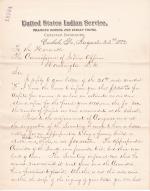
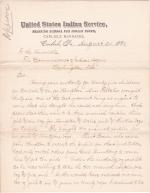
Richard Henry Pratt notifies the Commissioner of Indian Affairs that the delegation brought back by Anna Ely is different then what was approved. Pratt notes that he has sent certain students to the Hampton Institute as previously approved and Ely has agreed to raise charitable funds for the additional students with the help of one of the girls…
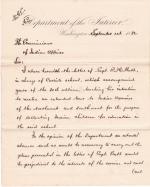
Acting Secretary of the Interior, M. L. Joslyn, instructs the Commissioner of Indian Affairs to stop Richard Henry Pratt from traveling West as had written previously. Pratt had desired to go West in order to bring back Sioux students from various agencies as well as a group of Navajo students.
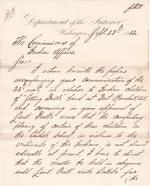
Correspondence regarding the enrollment of children from the Sitting Bull band of Sioux being held as prisoners at Fort Randall. The officer in charge of Fort Randall indicates that the parents of the eligible children do not wish to see their children to be enrolled at Carlisle. Pratt notes that he would prefer to speak to these parents to…
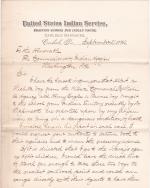
Richard Henry Pratt requests to return Alfred Charko (mistakenly listed as Albert in Pratt's letter, but properly identified at Alfred in the physician's letter) and Henry Eagle Chief to their homes due to their ill health. Pratt notes that he can escort the students back to their homes if he is given permission to visit the Navajo Agency.
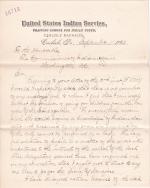
Richard Henry Pratt requests the Commissioner of Indian Affairs reconsider its decision to not allow him personally to go select students at the Navajo and Sioux Agencies. Pratt believes that none of his employees have the requisite knowledge to successfully select students from the agencies.
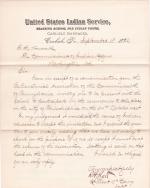
Richard Henry Pratt informs the Commissioner of Indian Affairs that the he and the Carlisle Indian School have been invited to attend and participate at the Bi-Centennial celebration in Philadelphia, Pennsylvania on October 24, 1882. Pratt recommends accepting the invitation if the Bi-Centennial Association pays the costs.
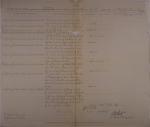
Estimate of funds for the fourth quarter of 1882 amounting to $8,682.25 for support of the school, and an additional $4,976.25 for employee wages.
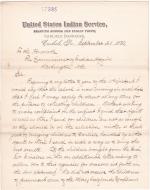
Richard Henry Pratt provides the Commissioner of Indian Affairs the total and per capita expenses for educating Pine Ridge and Rosebud students as well as Sisseton Agency students.
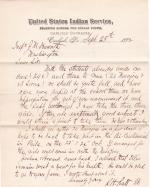
Richard Henry Pratt notes that the school is already ten percent over its appropriation in terms of students but he would be willing to accept three Ottawa Nation girls if the J. M. Haworth recommends they be brought to Carlisle. Pratt writes that when he goes to pick up 20 Navajo students he can bring back the Ottawa girls as well.
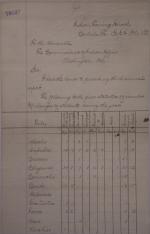
Third annual report of the Carlisle Indian School providing statistics of the number of students from various nations during the school year. Pratt notes that the outing system has been highly successful and comments on the progress of the first group of students from the Sioux Nation along with other groups of students from the Cheyenne,…
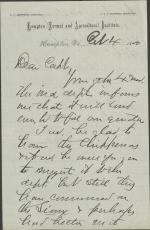
Samuel Chapman Armstrong of the Hampton Institute writes to Richard Henry Pratt discussing enrollment quotas as well as the Chippewa and Sioux.
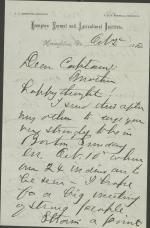
Samuel Chapman Armstrong of the Hampton Institute writes to Richard Henry Pratt, urging him to attend a large meeting in Boston where 24 Hampton students would be present, to convince the public of the value of Indian education.
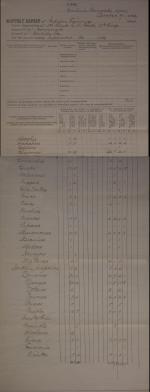
Richard Henry Pratt submits this Monthly School Report for September 1882.
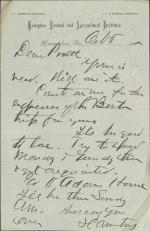
Samuel Chapman Armstrong of the Hampton Institute writes to Richard Henry Pratt discussing logistics of a trip to Boston.
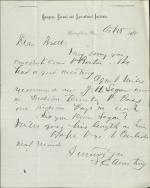
Samuel Chapman Armstrong of the Hampton Institute writes to Richard Henry Pratt regretting that Pratt was unable to come to Boston for a meeting, and asks for information on J. H. Segar, an individual recommended to Armstrong by Agent Miles to oversee male students' work at Hampton.
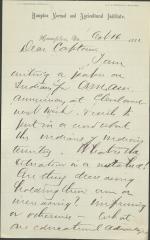
Samuel Chapman Armstrong of the Hampton Institute writes to Richard Henry Pratt asking for information about Indian Territory and its peoples to include in a paper for the American Missionary Association meeting in Cleveland.
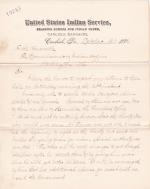
Richard Henry Pratt reports that he returned from his trip to recruit Navajo students. He notes that he only brought back 12 Navajo students rather than the allotted 20.
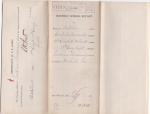
Richard H. Pratt submits this Monthly School Report for October 1882.
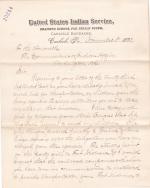
Richard Henry Pratt informs the Commissioner of Indian Affairs that he has received word that Sitting Bull refuses to send any children to Carlisle. As a result he has directed his representative to go directly to Rosebud or Pine Ridge to bring back students. He ended by saying that if there are more students desiring to come from Rosebud or…
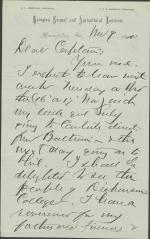
Samuel Chapman Armstrong of the Hampton Institute writes to Richard Henry Pratt with trip logistics for Armstrong's visit to Carlisle, including an expressed desire to meet with supporters at Dickinson College.
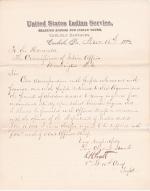
Richard Henry Pratt requests $50 worth of 3 cent stamps in order for the Carlisle Indian School to correspond with outing patrons, returned students, parents, and official inquiries.
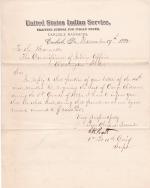
Richard Henry Pratt replies to an inquiry that the cost of recruiting Osage students for the third quarter of 1882 was $2143.96.
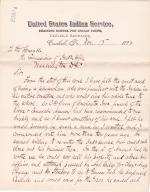
Richard Henry Pratt informs the Office of Indian Affairs that he has hired Obadiah G. Given as the Carlisle Indian School physician. Pratt details how he came to the decision as well as Given's salary.
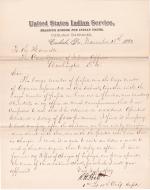
Captain Richard H. Pratt submits a report that lists new employees (Florence M. Carter, M. E. Snyder), those who have left the school (Mary Spain, Emma C. Sickels, Thomas Stewart Jr., Margaret Wilson, H. H. Shiverick), and those who have changed positions (Ella L. Patterson, Anne S. Ely). These reports include personal information about those…
